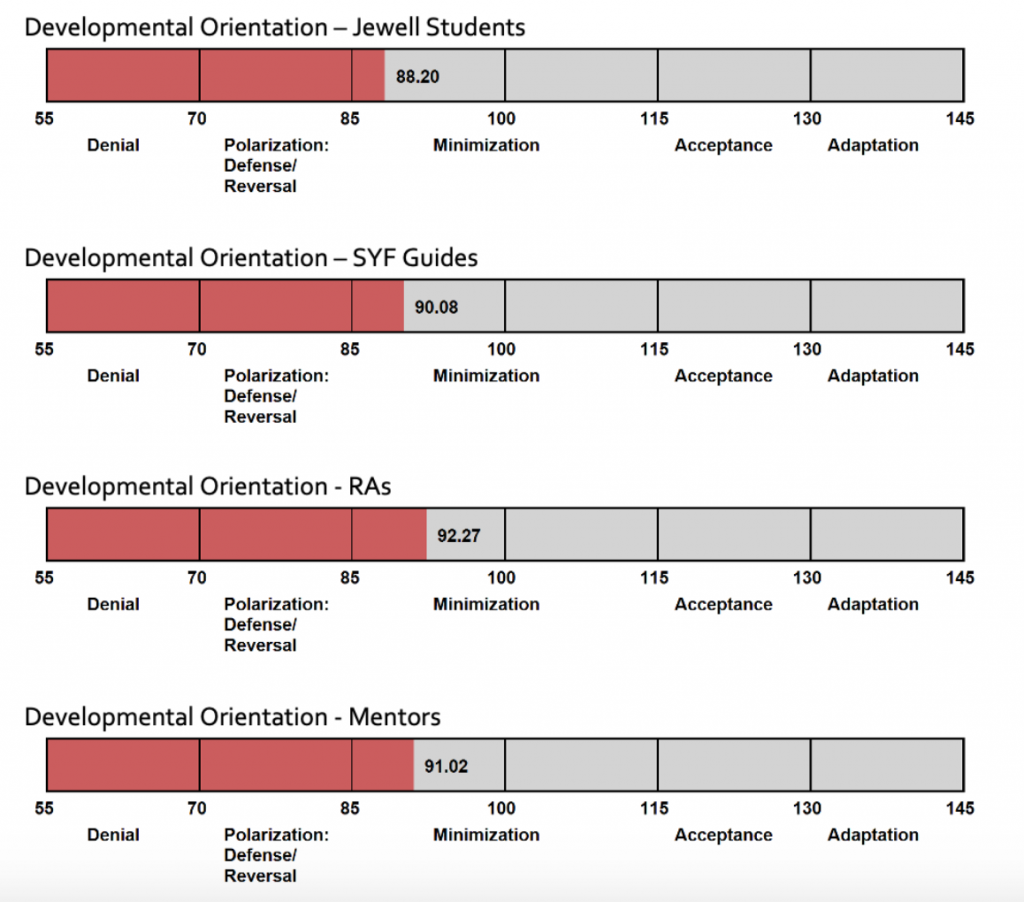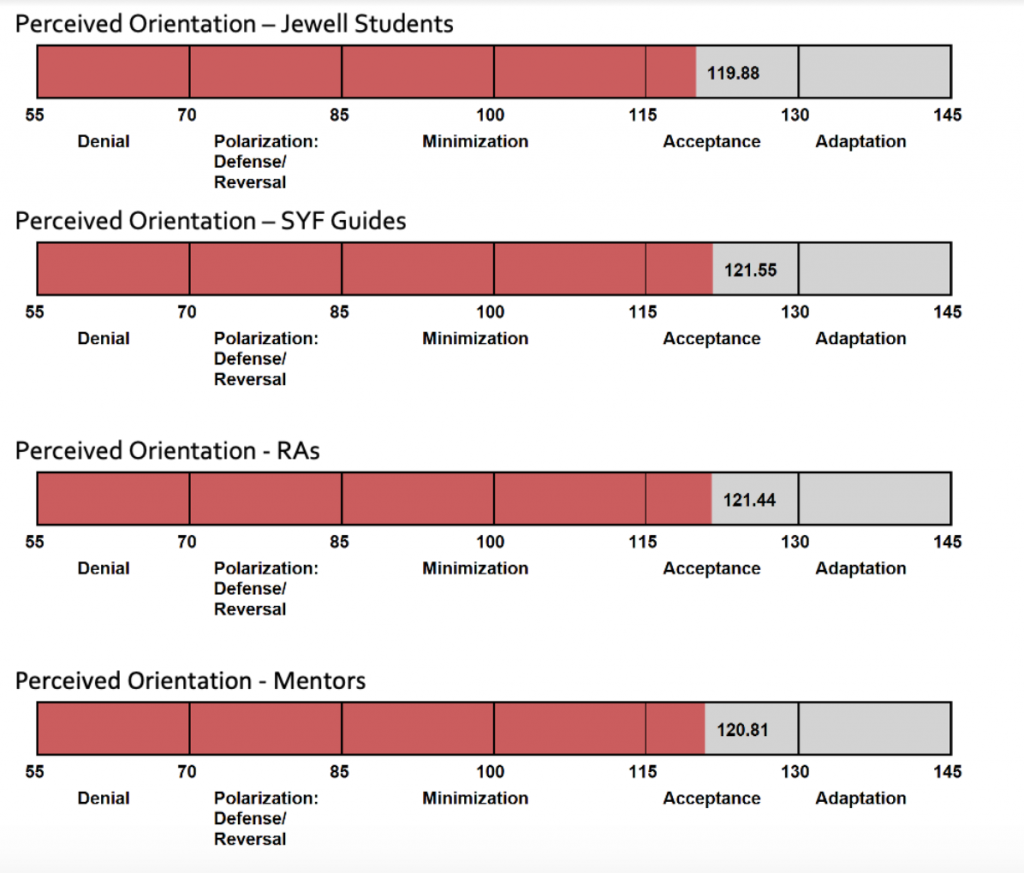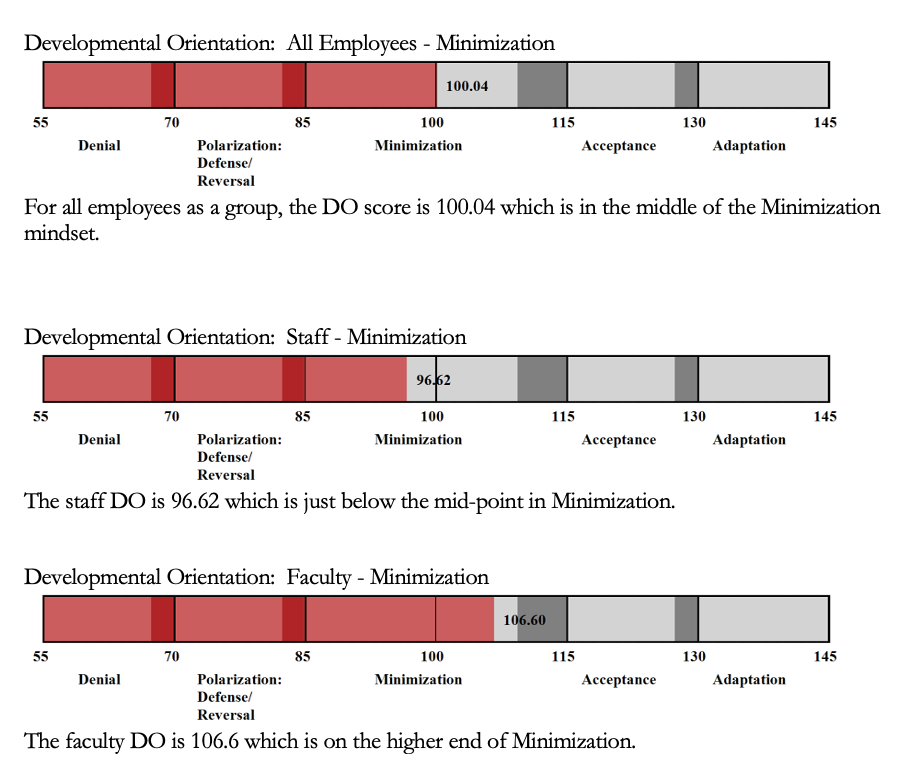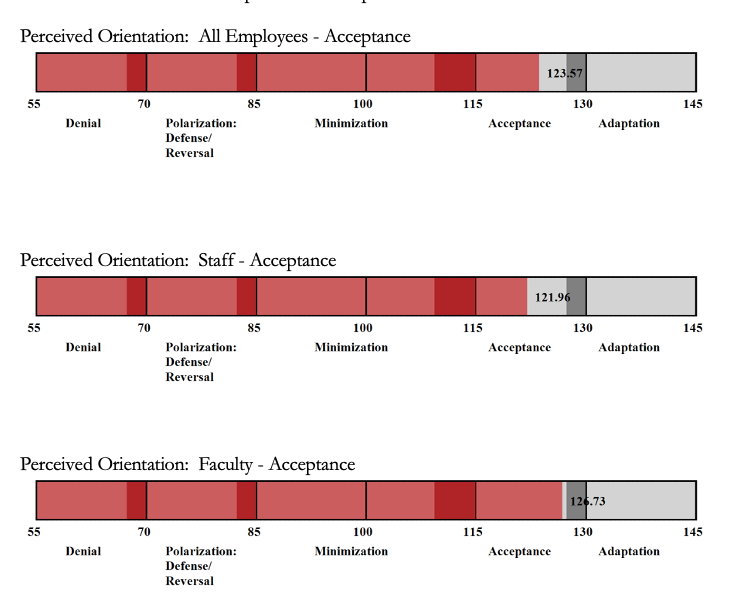In 2013, Dr. Andy Pratt, special counsel on diversity & inclusivity, became a qualified administrator of the Intercultural Development Inventory (IDI). The IDI is a psychometric inventory intended to gauge individual and group levels of intercultural competence. Intercultural competence describes the capacity of an individual or group to accept and adapt to cultural differences. Since 2013, the IDI has been administered primarily to faculty and staff at William Jewell College. Some select student groups – including Student Senators, Shape Your Future guides, resident assistants and orientation mentors – have also taken the inventory.
Jewell started administering the IDI in order to establish a quantitative benchmark for where the campus stands in terms of its intercultural competence. The IDI offers aspirational goals for elevating levels of intercultural competence.
The IDI is a 50-question assessment that evaluates three facets of intercultural competence: Developmental Orientation (DO), Perceived Orientation (PO) and Orientation Gap. DO scores represent the respondents’ primary orientation to cultural differences and the perspective they assume when responding to cultural differences. Alternatively, PO scores represent the perspective that respondents aspire to assume when responding to cultural differences. DO and PO are measured on a linear scale divided into five subsections: Denial, Polarization, Minimization, Acceptance and Adaptation. The Orientation Gap represents the gap between DO and PO.
Individuals and groups who score in the Denial section are characterized by disinterest and avoidance of cultural differences. Scores in the Polarization subsection, which can be categorized as either Defense or Reversal, indicate that the respondent views cultural differences from an us-versus-them perspective. Defense Polarization is defined as believing one’s culture is superior to others, while Reversal Polarization is defined as believing one’s culture is inferior to others. The Minimization category is named for the tendency of respondents to dismiss cultural differences in favor of identifying commonalities between cultures. Scores in the Acceptance category represent an appreciation of patterns of cultural difference. Finally, scores in the Adaptation subsection indicate an active participation in bridging gaps between cultures and an intent to shift one’s cultural perspective appropriately.
Data from staff and faculty and these student groups from 2013-2020 has indicated that Jewell community members fall primarily in the Minimization category for their Developmental Orientation. The majority of Jewell community members fall into the Acceptance category for their Perceived Orientation. A specific breakdown of student group results from July 2020 can be viewed below. This information comes from the IDI results of 89 students who were either Student Senators, Tucker Leadership Lab facilitators, basketball players, Shape Your Future guides, resident assistants or orientation mentors.
Staff and faculty are the primary respondents to the IDI and have been tested regularly since 2013. The most recent report from January 2019 also puts staff and faculty, as a group, in the Minimization category for their Developmental Orientation and in the Acceptance category for their perceived orientation. On average, Jewell exceeded the general population’s average for scoring in the Acceptance and Adaptation categories and was below the national average scoring in the Denial and Polarization categories. The average results from this January 2019 report of staff and faculty can be seen in the images below.
The IDI is regularly evaluated for validity by independent examiners. According to its website, the IDI has been “rigorously tested and found to possess high cross-cultural validity and reliability.”
Pratt emphasized that the College does not use the IDI in hiring or in employee performance evaluations.
Rather, the IDI is used as a quantitative measure of cultural competence within the Jewell community. Using the IDI as a quantitative reference, Pratt noted, can help the College gauge where its current state of intercultural competence is and how it can improve in competence.
“[The IDI] gives us clear data showing that we are a predominantly white-cultured institution. For a few years there has been the assertion that we need culture change at Jewell. I think the IDI is quantitative evidence of that being the case,” Pratt said. “We need to change our culture at Jewell because the majority of people got scores in Minimization… Along with that, the IDI prompts conversation. It gets us talking about these things and gives us a common language to talk about it.”
Pratt also pointed to a connection between the emphasis the inventory places on understanding both one’s own and others’ identities and one of Jewell’s core curriculum classes.
“The Acceptance mindset in IDI is based upon an understanding of one’s own self – your own cultural identity – and taking the time to understand the cultural identity of others. There is, I think a very direct correlation between that and [the core curriculum class] CTI 150: Identity & Society,” Pratt said.
Pratt shared that the results from the IDI have been used to inform how the College approaches its initiatives. Dr. Pratt noted that Dr. Rodney Smith, vice president for access and engagement, and Stephenie Smith, have constructed some of their radical inclusivity workshops with the goal of moving the Jewell community out of the Minimization stage and into the Acceptance stage. For example, the Smiths have held a workshop exploring the racial divide in the Kansas City metropolitan area in order to emphasize the importance of acknowledging cultural differences.
“[Rodney and Stephenie Smith, in their diversity & inclusivity consulting work with Jewell,] have stressed that racism comes in a benign form and not in a hateful form. People will say ‘I’m not a hater,’ and they’re right – they’re not haters. The vast majority of us are not haters, but we implicitly participate in cultures that are racist,” Pratt said. “So, I think that message has been very well-received because a lot of us at Jewell got scores in minimization.”
In his position as the vice president for access and engagement, Smith has used the Jewell community’s results on the IDI to help him understand where the College stands in its intercultural competence levels.
“It’s normal that we all have been socialized in some regards to minimize difference. We say things like ‘I want to treat everybody the same,’ but if we really intellectualize and conceptualize that concept, that’s virtually impossible because everybody’s different… And it’s okay, and we have to become fine with that,” Smith said.
Addressing the extent to which the IDI is a valid measure of a concept as abstract as intercultural competence, Smith noted that it is likely that there may be flaws in the methodology. Ultimately, though, he believes the IDI is a useful tool that can help us become a better campus.
“There may be some flaws in the methodology of the inventory, but we have to calculate that into the outcomes. We know that there is no such thing as complete objectivity, even in the most scientific of mechanisms,” Smith said. “I have this understanding that there will be some flaws in the methodology but not enough to where I discount the validity of the inventory and the supposed focus, the aspirations, of the inventory. At the end of the day, it’s only trying to make us better.”
Smith noted that he prefers the terms “intercultural humility” or “intercultural reciprocity” over the term “intercultural competence,” as he believes full intercultural competence is impossible due to the dynamic nature of culture. Rather, he emphasizes the necessity of intercultural engagement in cultural exchange.
In explaining how adaptation promotes equity, Smith drew a parallel to the Americans with Disabilities Act and its mandate to make public spaces accessible to individuals with disabilities.
“One example I often refer to in a broad way is our ADA compliance laws… I don’t need ramps, but ramps on our buildings is an indication that we’re trying to be equitable in providing access to those that have diverse abilities,” Smith said. “Those are great examples of us adapting our spaces. The inventory is trying to get us to a place where we are accustomed to adapting our spaces to the differences that people have.”
Smith shared that he would soon become a qualified administrator and hopes to officially join Pratt in administering the inventory by the end of the semester.
Toward the end of this semester, Pratt plans to prepare another campus report based on the data collected from IDI responses from Jewell staff, faculty and students in 2020.




